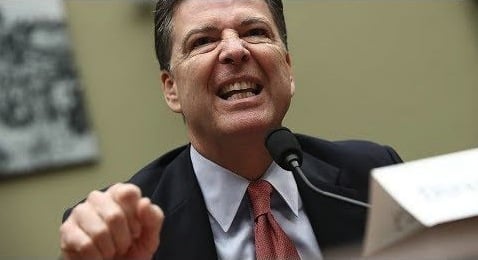A media themelet is Trump fired then-FBI director James Comey because Comey would not let Michael Flynn off the hook. Flynn was caught in a perjury trap, lying about a legally-allowed meeting he held with the Russian ambassador. The FBI had the meet under surveillance and knew Flynn was not telling the truth later in an interview. Comey’s firing also forms a core tenet of the “obstruction truther” movement.
We know a lot more about what was going on then now than we did then. Time for some thinking out loud.
I think the Comey firing is tied to the Christopher Steele dossier. We may someday learn Trump fired Comey because the FBI acted on the dossier to surveil Trump’s team from July 2016 to January 2017 without giving Trump a defensive briefing the Russians might be inside his campaign, signaling the FBI wanted to take Trump down, not protect him or America. No president could have confidence in his FBI director after that.
There has been no discussion as to why, in possession of information they seemed to believe showed the Russians were running a global full-court press to recruit inside Trump’s inner circle, Trump was never offered a defensive briefing by the FBI. Such a warning – hey, you may not know it, but here’s how you are in danger – is common inside government. But in Trump’s case it never happened and no one seems to want to formally ask (say at a Senate hearing) why.
That the FBI withheld the dossier from Trump, did not provide him with a defensive warning, and then used the information to collect against him did happen, and Comey was in charge. It is a shameful episode that harkens back to the J. Edgar Hoover days of an FBI that used its power to manipulate government. While referring by name only to Comey’s equally shameful handling of the Hillary Clinton email investigation(s), Deputy Attorney General Rod Rosenstein in his letter recommending Comey be fired wrote:
The Federal Bureau of Investigation has long been regarded as our nation’s premier federal investigative agency. Over the past year, however, the FBI’s reputation and credibility have suffered substantial damage, and it has affected the entire Department of Justice. That is deeply troubling to many Department employees and veterans, legislators and citizens.
Donald Ayer, who served as Deputy Attorneys General under President HW Bush, along with former Justice Department officials, was “astonished and perplexed” by [Comey’s] decision to “break with longstanding practices followed by officials of both parties during past elections.” Ayer’s own letter noted, “Perhaps most troubling… is the precedent set by this departure from the Department’s widely-respected, non-partisan traditions.”
Both men wrote only of Comey-Clinton, but one wonders if they did not have Comey-Steele-Trump in mind as well.
My guess is history will show by January 2017 the FBI likely knew there was nothing to the dossier (one of the first things to read for in the full Mueller report is a clue as to how early he came to understand there was no collusion.) It was only then Comey unveiled the dossier to then president-elect Trump in a 1:1 brief in Trump Tower. That was on January 6, 2017, some three months after using the dossier in part to obtain a FISA warrant against Trump aide Carter Page. Comey almost certainly mentioned while Trump may not have heard of it, the dossier had already been widely shared inside the media, the State Department, and the intelligence community.
No one really knows what was said in that meeting, but we do know that after holding the dossier since summer 2016 four days after the Trump-Comey dossier meeting Buzzfeed published the whole document and the world learned about the pee tape and you had to explain what Golden Showers are to your mom. Many believe someone in the intel community gave “permission” to the media, signaling Clapper, Hayden, Comey, et al, would be making supporting statements that the dossier “could be true.”
It is possible Trump, paranoid, embarrassed, and defensive, saw Comey’s moves in their January 2017 meeting as a blackmail attempt. Or at least a show of force — look what the FBI can do if you make trouble. Comey’s firing may have had a lot more to do with the dossier than it did with Michael Flynn.
That leaks about Flynn and the Russian ambassador, believed to be from the Obama White House after advisors Susan Rice and Samantha Powers unmasked the identities of various American persons inside intercepts collected incidentally, only added to a sense of paranoia.
Jeff Sessions was similarly incidentally surveilled, as was former White House chief strategist Steve Bannon, whose conversations were picked up as part of a FISA warrant issued against Trump associate Carter Page. Paul Manafort and Richard Gates were also the subjects of FISA-warranted surveillance: they were surveilled in 2014, the case was dropped for lack of evidence, and then they were re-surveilled after they joined the Trump team and became more interesting to the state.
Officials on the National Security Council revealed that Trump himself may also have been swept up in the surveillance of foreign targets. Devin Nunes, chair of the House Intelligence Committee, claims multiple communications by Trump transition staff were inadvertently picked up. Trump officials were monitored by British GCHQ with the information shared with their NSA partners.
Trump’s March 2017 claims to have been “wiretapped” by Obama, ridiculed by the media at the time, take on new credibility. That surveillance was spearheaded by James Comey and Trump fired him for it.
Reprinted with permission from WeMeantWell.com.


